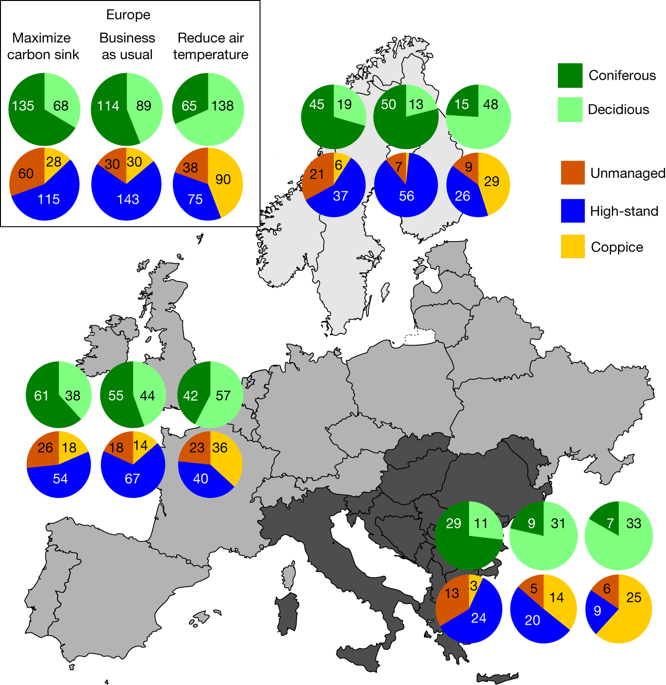Our official English website, www.x-mol.net, welcomes your feedback! (Note: you will need to create a separate account there.)
Trade-offs in using European forests to meet climate objectives
Nature ( IF 64.8 ) Pub Date : 2018-10-01 , DOI: 10.1038/s41586-018-0577-1 Sebastiaan Luyssaert , Guillaume Marie , Aude Valade , Yi-Ying Chen , Sylvestre Njakou Djomo , James Ryder , Juliane Otto , Kim Naudts , Anne Sofie Lansø , Josefine Ghattas , Matthew J. McGrath
Nature ( IF 64.8 ) Pub Date : 2018-10-01 , DOI: 10.1038/s41586-018-0577-1 Sebastiaan Luyssaert , Guillaume Marie , Aude Valade , Yi-Ying Chen , Sylvestre Njakou Djomo , James Ryder , Juliane Otto , Kim Naudts , Anne Sofie Lansø , Josefine Ghattas , Matthew J. McGrath

|
The Paris Agreement promotes forest management as a pathway towards halting climate warming through the reduction of carbon dioxide (CO2) emissions1. However, the climate benefits from carbon sequestration through forest management may be reinforced, counteracted or even offset by concurrent management-induced changes in surface albedo, land-surface roughness, emissions of biogenic volatile organic compounds, transpiration and sensible heat flux2–4. Consequently, forest management could offset CO2 emissions without halting global temperature rise. It therefore remains to be confirmed whether commonly proposed sustainable European forest-management portfolios would comply with the Paris Agreement—that is, whether they can reduce the growth rate of atmospheric CO2, reduce the radiative imbalance at the top of the atmosphere, and neither increase the near-surface air temperature nor decrease precipitation by the end of the twenty-first century. Here we show that the portfolio made up of management systems that locally maximize the carbon sink through carbon sequestration, wood use and product and energy substitution reduces the growth rate of atmospheric CO2, but does not meet any of the other criteria. The portfolios that maximize the carbon sink or forest albedo pass only one—different in each case—criterion. Managing the European forests with the objective of reducing near-surface air temperature, on the other hand, will also reduce the atmospheric CO2 growth rate, thus meeting two of the four criteria. Trade-off are thus unavoidable when using European forests to meet climate objectives. Furthermore, our results demonstrate that if present-day forest cover is sustained, the additional climate benefits achieved through forest management would be modest and local, rather than global. On the basis of these findings, we argue that Europe should not rely on forest management to mitigate climate change. The modest climate effects from changes in forest management imply, however, that if adaptation to future climate were to require large-scale changes in species composition and silvicultural systems over Europe5,6, the forests could be adapted to climate change with neither positive nor negative climate effects.Simulations of commonly proposed forest-management portfolios for Europe show that no single portfolio would meet all the requirements of the Paris Agreement, and climate benefits from forest management would be modest and local.
中文翻译:

利用欧洲森林实现气候目标的权衡
《巴黎协定》将森林管理作为通过减少二氧化碳 (CO2) 排放来阻止气候变暖的途径1。然而,通过森林管理固碳带来的气候效益可能会被同时管理引起的地表反照率、地表粗糙度、生物挥发性有机化合物的排放、蒸腾作用和感热通量的变化加强、抵消甚至抵消2-4。因此,森林管理可以在不阻止全球气温上升的情况下抵消二氧化碳排放。因此,普遍提出的欧洲可持续森林管理组合是否符合《巴黎协定》仍有待确认——也就是说,它们是否可以降低大气 CO2 的增长率,减少大气顶部的辐射不平衡,到 21 世纪末,既不增加近地表气温,也不减少降水。在这里,我们展示了由通过碳固存、木材使用以及产品和能源替代在本地最大化碳汇的管理系统组成的组合降低了大气 CO2 的增长率,但不满足任何其他标准。最大化碳汇或森林反照率的投资组合仅通过一个标准——在每种情况下都不同——标准。另一方面,以降低近地表气温为目标的欧洲森林管理也将降低大气二氧化碳的增长率,从而满足四个标准中的两个。因此,在使用欧洲森林来实现气候目标时,权衡是不可避免的。此外,我们的研究结果表明,如果维持目前的森林覆盖率,通过森林管理实现的额外气候效益将是适度的、局部的,而不是全球性的。基于这些发现,我们认为欧洲不应依赖森林管理来缓解气候变化。然而,森林管理变化对气候的适度影响意味着,如果适应未来的气候需要欧洲范围内物种组成和造林系统的大规模变化5,6,那么森林可以以既不积极也不消极的方式适应气候变化气候影响。对欧洲普遍提出的森林管理组合的模拟表明,没有一个组合能够满足《巴黎协定》的所有要求,森林管理带来的气候效益将是适度的和局部的。通过森林管理实现的额外气候惠益将是适度和局部的,而不是全球性的。基于这些发现,我们认为欧洲不应依赖森林管理来缓解气候变化。然而,森林管理变化对气候的适度影响意味着,如果适应未来的气候需要欧洲范围内物种组成和造林系统的大规模变化5,6,那么森林可以以既不积极也不消极的方式适应气候变化气候影响。对欧洲普遍提出的森林管理组合的模拟表明,没有一个组合能够满足《巴黎协定》的所有要求,森林管理带来的气候效益将是适度的和局部的。通过森林管理实现的额外气候惠益将是适度和局部的,而不是全球性的。基于这些发现,我们认为欧洲不应依赖森林管理来缓解气候变化。然而,森林管理变化对气候的适度影响意味着,如果适应未来的气候需要欧洲范围内物种组成和造林系统的大规模变化5,6,那么森林可以以既不积极也不消极的方式适应气候变化气候影响。对欧洲普遍提出的森林管理组合的模拟表明,没有一个组合能够满足《巴黎协定》的所有要求,森林管理带来的气候效益将是适度的和局部的。而不是全球。基于这些发现,我们认为欧洲不应依赖森林管理来缓解气候变化。然而,森林管理变化对气候的适度影响意味着,如果适应未来的气候需要欧洲范围内物种组成和造林系统的大规模变化5,6,那么森林可以以既不积极也不消极的方式适应气候变化气候影响。对欧洲普遍提出的森林管理组合的模拟表明,没有任何一个组合能够满足《巴黎协定》的所有要求,森林管理带来的气候效益将是适度的和地方性的。而不是全球。基于这些发现,我们认为欧洲不应依赖森林管理来缓解气候变化。然而,森林管理变化对气候的适度影响意味着,如果适应未来的气候需要欧洲范围内物种组成和造林系统的大规模变化5,6,那么森林可以以既不积极也不消极的方式适应气候变化气候影响。对欧洲普遍提出的森林管理组合的模拟表明,没有一个组合能够满足《巴黎协定》的所有要求,森林管理带来的气候效益将是适度的和局部的。
更新日期:2018-10-01
中文翻译:

利用欧洲森林实现气候目标的权衡
《巴黎协定》将森林管理作为通过减少二氧化碳 (CO2) 排放来阻止气候变暖的途径1。然而,通过森林管理固碳带来的气候效益可能会被同时管理引起的地表反照率、地表粗糙度、生物挥发性有机化合物的排放、蒸腾作用和感热通量的变化加强、抵消甚至抵消2-4。因此,森林管理可以在不阻止全球气温上升的情况下抵消二氧化碳排放。因此,普遍提出的欧洲可持续森林管理组合是否符合《巴黎协定》仍有待确认——也就是说,它们是否可以降低大气 CO2 的增长率,减少大气顶部的辐射不平衡,到 21 世纪末,既不增加近地表气温,也不减少降水。在这里,我们展示了由通过碳固存、木材使用以及产品和能源替代在本地最大化碳汇的管理系统组成的组合降低了大气 CO2 的增长率,但不满足任何其他标准。最大化碳汇或森林反照率的投资组合仅通过一个标准——在每种情况下都不同——标准。另一方面,以降低近地表气温为目标的欧洲森林管理也将降低大气二氧化碳的增长率,从而满足四个标准中的两个。因此,在使用欧洲森林来实现气候目标时,权衡是不可避免的。此外,我们的研究结果表明,如果维持目前的森林覆盖率,通过森林管理实现的额外气候效益将是适度的、局部的,而不是全球性的。基于这些发现,我们认为欧洲不应依赖森林管理来缓解气候变化。然而,森林管理变化对气候的适度影响意味着,如果适应未来的气候需要欧洲范围内物种组成和造林系统的大规模变化5,6,那么森林可以以既不积极也不消极的方式适应气候变化气候影响。对欧洲普遍提出的森林管理组合的模拟表明,没有一个组合能够满足《巴黎协定》的所有要求,森林管理带来的气候效益将是适度的和局部的。通过森林管理实现的额外气候惠益将是适度和局部的,而不是全球性的。基于这些发现,我们认为欧洲不应依赖森林管理来缓解气候变化。然而,森林管理变化对气候的适度影响意味着,如果适应未来的气候需要欧洲范围内物种组成和造林系统的大规模变化5,6,那么森林可以以既不积极也不消极的方式适应气候变化气候影响。对欧洲普遍提出的森林管理组合的模拟表明,没有一个组合能够满足《巴黎协定》的所有要求,森林管理带来的气候效益将是适度的和局部的。通过森林管理实现的额外气候惠益将是适度和局部的,而不是全球性的。基于这些发现,我们认为欧洲不应依赖森林管理来缓解气候变化。然而,森林管理变化对气候的适度影响意味着,如果适应未来的气候需要欧洲范围内物种组成和造林系统的大规模变化5,6,那么森林可以以既不积极也不消极的方式适应气候变化气候影响。对欧洲普遍提出的森林管理组合的模拟表明,没有一个组合能够满足《巴黎协定》的所有要求,森林管理带来的气候效益将是适度的和局部的。而不是全球。基于这些发现,我们认为欧洲不应依赖森林管理来缓解气候变化。然而,森林管理变化对气候的适度影响意味着,如果适应未来的气候需要欧洲范围内物种组成和造林系统的大规模变化5,6,那么森林可以以既不积极也不消极的方式适应气候变化气候影响。对欧洲普遍提出的森林管理组合的模拟表明,没有任何一个组合能够满足《巴黎协定》的所有要求,森林管理带来的气候效益将是适度的和地方性的。而不是全球。基于这些发现,我们认为欧洲不应依赖森林管理来缓解气候变化。然而,森林管理变化对气候的适度影响意味着,如果适应未来的气候需要欧洲范围内物种组成和造林系统的大规模变化5,6,那么森林可以以既不积极也不消极的方式适应气候变化气候影响。对欧洲普遍提出的森林管理组合的模拟表明,没有一个组合能够满足《巴黎协定》的所有要求,森林管理带来的气候效益将是适度的和局部的。



























 京公网安备 11010802027423号
京公网安备 11010802027423号